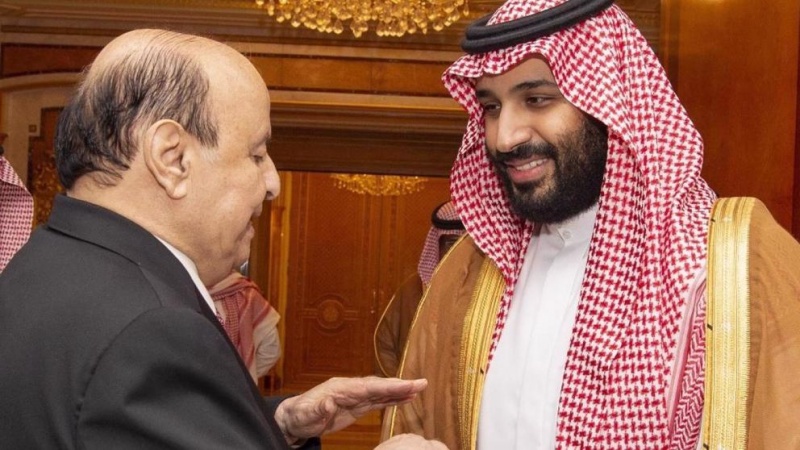Alwaght- Saudi Arabia’s crown prince Mohammed bin Salman (MBS) reportedly forced former Yemeni president Abd Rabbuh Mansur Hadi to delegate his self-proclaimed authority to a newly-established body after he held a private meeting with US National Security Advisor Jake Sullivan.
Rai al-Youm, an Arabic language digital news and opinion website, cited an informed Yemeni source as saying that MBS was aghast with Hadi’s private meeting with Sullivan that took place during the latter’s recent visit to Riyadh without the attendance of any Saudi official.
The source added that MBS "expressed his outrage" by ousting Hadi, who has long been seen as staunchly loyal to the kingdom rulers.
According to the report, Hadi’s two sons, Nasser and Jalal, have been put under house arrest for accumulating staggering wealth and their whereabouts remain unknown.
On April 7, Hadi announced that he had delegated his powers to the “presidential leadership” council and dismissed vice president Ali Mohsen al-Ahmar from his position.
The Wall Street Journal on April 17 cited anonymous Saudi and Yemeni officials as saying that Mohammed bin Salman gave Hadi a written decree, transferring his powers to the council.
According to the WSJ report, Hadi implemented the order after some Saudi officials threatened to disclose what they said was evidence of his corruption.
The report further said that officials have confined Hadi to his home in Riyadh and denied him access to phones since the day he announced his resignation.
Hadi had resigned from the presidency in early 2015 and fled to Riyadh following a popular uprising led by the Ansarullah resistance movement. He later rescinded his resignation after arriving in Saudi Arabia, ostensibly under the pressure of his political patrons.
To reinstall Hadi, Saudi Arabia launched the bloody war on Yemen in March 2015 in association with its Arab allies and with arms and logistics support from the US and other Western states.
The objective was to restore the unpopular Hadi regime and crush the Ansarullah movement, which has been running state affairs in the absence of a functional government in Yemen.
The Saudi-led coalition has failed to meet its objectives, despite killing hundreds of thousands of Yemenis and spawning the world’s worst humanitarian crisis.
Hadi’s move to hand over his self-proclaimed powers came days after a fragile two-month truce, brokered by the United Nations, came into effect.
Citing sources within Yemen’s popular Ansarullah resistance movement, Rai al-Youm said the extension of the truce "seems to be difficult" due to the Saudi-led coalition’s failure to abide by the agreement’s most important provision, which is the lifting of the siege imposed on Sana'a airport in Yemen's capital and the port of al-Hudaydah.
The UN-brokered agreement was supposed to provide a let-up in the foreign-imposed war and relief to the war-weary Yemenis, but the coalition’s refusal to fulfill its obligations has further complicated the situation.



























